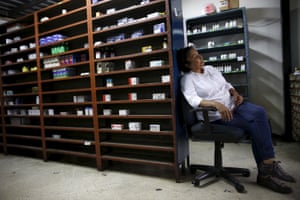UN security council officials clash over ‘politicised’ aid to troubled country as peace-building chief warns of ‘grim realities’
Infant mortality in Venezuela has soared by roughly 50% during the prolonged political crisis in the country.
Briefing the UN security council, the UN’s political and peace building chief, Rosemary DiCarlo, depicted a devastating collapse in Venezuela’s health system. She warned that 40% of medical staff had left the country and said hospital stocks of medicine had dwindled to 20% of the required level.
DiCarlo said the “protracted crisis” in the country had led in recent weeks to an “alarming escalation of tensions”. Four people died and hundreds were injured in clashes last weekend at the country’s borders.
Security council members clashed over the increasingly politicised humanitarian aid efforts to Venezuela, the government of which, led by Nicolás Maduro, is backed by China and Russia, and opposed by the US and a number of European and Latin American countries, who want Maduro to step down.G
Read more
DiCarlo warned of the “grim reality” facing a country where citizens are dying of preventable causes and 3.4 million people have fled the worsening conditions.
Commenting on the recent politicisation of aid efforts to Venezuela, DiCarlo said the UN was coordinating efforts to deliver assistance as close as possible to Venezuelans in need. She added that aid delivery should be free “from political objectives and delivered on the basis of need”.
DiCarlo noted that while supplies sent by Russia and China have entered the country, in coordination with the Venezuelan government, supplies from the US and other countries have been stockpiled at the Colombian and Brazilian borders. Earmarked for distribution by the Venezuelan opposition, these supplies remained blocked from entering the country by Venezuelan authorities, she said.
The politicisation of aid efforts has caused widespread alarm in the international aid community. Many have watched with dismay as supporters of both sides have sought to funnel aid to the advantage of one or other of the rival parties, some trying to back the government of Maduro, others the opposition led by Juan Guaidó, the self-declared interim president, who is championed by the US.Advertisement
DiCarlo’s presentation to the security council followed violent clashes at the weekend that focused on failed efforts to deliver aid to the Venezuelan opposition.
Quoting Colombian and UN human rights officials, DiCarlo blamed the involvement of pro-government armed elements in the violent attacks on protestors at Venezuela’s borders that left four dead and 285 injured.
Speaking on behalf of the US, Elliott Abrams, the Trump administration’s special representative for Venezuela, called on the members of the security council to “pressure the illegitimate regime to peacefully step down”, accusing Maduro of preferring to “block and burn donated medicine and bread than see it in the hands of Venezuelan children”.
Russia’s representative, Vassily Nebenzia, countered by painting US-backed efforts to deliver aid at the weekend as “an attempted illegal state border crossing for the delivery of unknown cargo”, adding that the aid had not been requested by the Venezuelan government.

A pharmacy in Caracas. The Maduro government has been accused of blocking medical aid supplies. Photograph: Noel West/Reuter
Read more
Despite the deadly clashes at the weekend, the Trump administration appeared to be running into increasing resistance to its approach to the standoff. Spain’s prime minister, Pedro Sánchez, said on Wednesday that while it was clear Maduro had “no intention of negotiating”, Spain was opposed to any foreign military intervention in the economically-strapped country.Advertisement
He “does not want sincere negotiations”, said Spain’s socialist leader, who earlier this month recognised Guaidó as interim leader of Venezuela after Maduro rejected pressure to call a snap general election.
Sánchez, however, firmly rejected any foreign military intervention to topple Maduro, which the US has touted as a possibility.
We express “our rejection of any non-peaceful solution, and particularly any foreign military intervention in Venezuela,” he told lawmakers.
“There are some mistakes of the past that must not be committed again.”
